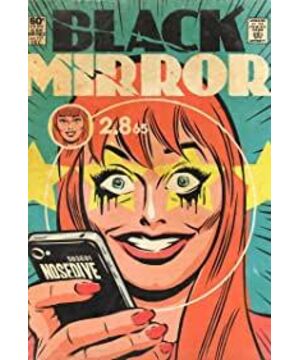This season is saying that with the development of technology we have to consider what is real and unreal? In the first episode, the episode in which everyone marked and evaluated each other was very impressive, and the so-called happiness must be played helplessly while wearing a mask. Humans are social animals, but if they leave their lives to the evaluation of others, will they still be human? In the end, the heroine no longer played the role of others in prison. I think that was the most comfortable moment for her when she scolded the so-called "criminal" opposite. The second episode reflects the brain-computer interface that is currently being studied. The value of horror games lies in bringing people fear and stimulation, and then people get the thrill of emotional fluctuations. If technology develops to use brain computers to personalize the most fearful things in players' own hearts, how should people adapt and face them? Will it crash like the protagonist. Within 0.04 seconds from the moment the male protagonist put on the instrument in the white room, he experienced a series of increasing fears, such as spiders, childhood bullies, cheating friends, father's dementia, failure of game experiments, and imprisonment. He returned to reality, and when he got home, his mother also suffered from Alzheimer's disease and knew that the most deadly fear of losing his mother made him finally collapse. The escalation of the entire fear is actually due to the collapse of one's own trust. The stronger the trust, the greater the fear of collapse. And what is very detailed in this episode is that all the fears of the male protagonist Cooper have the foreshadowing of the previous reality (so the boring foreshadowing at the beginning is necessary), the spider movie, the female protagonist's knife sandwich, the bully and the weird coat designed by passing programmers , the painting of the haunted house with lights on, and the father's dementia. All the fears can be traced, and these details are very careful.
The third episode feels relatively mediocre. It uses a progressive suspenseful plot rhythm to cover the issue of pedophilia, but it does not fully follow the suspenseful link, and it feels a little too big. At the end, I realized that the male protagonist is not just masturbating, but has a serious pathological tendency to pedophilia, so he was controlled step by step. In psychology, there is an effect similar to building a ladder, that is, first give the object a small goal that is not difficult to accomplish, and then gradually increase the difficulty gradually. The object will continue to accept this compromise because of sunk costs and inertial thinking, and then be gradually control.
The fourth episode finally redefines the worldview of this episode: that the dead can choose to have consciousness "live" in another virtual world all the time. In reality, the first girl had a car accident at the age of 21 and became seriously ill because of Lily's problem. In the end, she chose to go to another world for immortality. The second girl had her own normal life until she was old, but the only thing was that her husband did not die after her death. Instead of choosing to go to another world, they chose to die completely, because their daughter really died. So the second girl originally wanted to accompany her to stay in this world for a while because of the poor girl one, but the first girl fell in love with the second girl in this world. She hoped to live forever with the second girl in this world, but the second girl refused because she My husband chose to leave completely, which reminded me of an argument in the wonderful story: should the memory of the dead be forgotten? Although the final plot has a beautiful ending, the second female will always accompany the first female. However, if life is only as first seen, life is only as first seen.
The fifth episode is relatively novel with the theme of war, which is still rare in Black Mirror. But this episode is equally shocking, and it's a conflict triggered by Black Mirror's traditional technology, but this episode has risen to the level of political and military control over the masses. At the same time, the cause setting of the mass system is also very clever. After experiencing World War I, World War II and the Vietnam War, most soldiers will suffer from mental illness when they go home (because they know that they have killed innocent people with their own hands), even if they use soldiers And state responsibility as an excuse, but still can not really solve the problem. With the development of science and technology, when the mass system defaults the soldiers to the target as "cockroach" monsters, this psychological burden can be solved, and the human factor has been excluded and it has become a killing tool. The protagonist, Xiao Hei, realized through an accident that the army used lies to turn him into a pure killing tool. However, it is a tragedy that he has no choice but to be controlled in the face of power. The most shocking thing here is that even as a normal person of the villagers were not implanted with the mass system, which meant that they could clearly see the but solidly informed the army to let those "inferior people" die. This reminds me of the acquiescence of the fascist people to the hatred and slaughter of other countries and races during World War II.
Episode 6 When everyone has the right to commit cyber violence, then they will be punished for what they do. The killing tool of artificial bees satisfies the will of most, but also makes most of them be countered.
View more about Nosedive reviews











